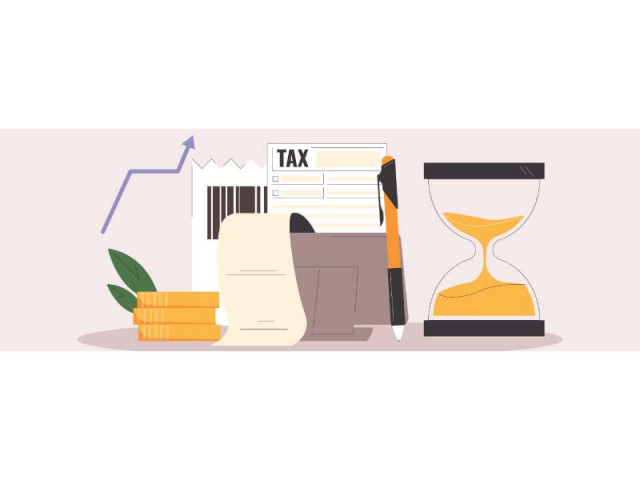Govt set to slap hefty tax on retailers
Aims to collect additional Rs100-200 billion per annum from shopkeepers

Pakistan has informed the International Monetary Fund (IMF) that it is planning to impose an indicative income-based tax on retailers aimed at increasing their contribution in the range of Rs100 billion to Rs200 billion per annum.
Tax authorities have shared broader contours of the proposal with the IMF, which the interim government wants to implement with effect from January next year, according to government sources.
No specific collection figure has been shared with
the IMF but assessment shows that roughly an additional Rs9 billion to Rs20 billion per month can be collected from the retailers through a fixed tax on shops, they said.
The Federal Board of Revenue (FBR) has proposed that the tax will be collected by the district tax officers instead of through electricity bills, which are already very high.
The tax has not been proposed on any specific
IMF demand, rather it is aimed at increasing the tax contribution by one of the highly under-taxed sectors, they added.
The government wants to use the indicative income of retailers, based on the location of their shops and rental payments, to assess the tax potential. Wholesale and retail sectors have about 19% share in the economy but their contribution to total taxes is less than 1%.
In case the proposal is vetted for enforcement, the government will not need any new legislation. Authorities have proposed to exercise legal powers available under Section 99B of the Income
Tax Ordinance.
Section 99B defines special procedures for small
traders and shopkeepers. It empowers the finance minister to impose tax through a notification in the official Gazette.
It has not yet been decided whether the tax will be collected across the country or it will be imposed in the first phase in major cities where the FBR has some idea about the income of retailers.
The FBR is currently collecting withholding taxes from real estate, based on locality-wise valuations of properties.
The previous Pakistan Democratic Movement (PDM) government had slapped a tax of Rs3,000 to Rs10,000 per month on retailers in the June 2022 budget but withdrew it within two months while succumbing to pressure from traders. The only window that
the FBR has to impose the tax is before February 8 general elections.
All mainstream political parties and military leaders have in the past surrendered to the shutter-down power of retailers.
At present, the retailers are paying 5% tax on up to Rs20,000 monthly electricity bills and 7.5% on bills of over Rs20,000. There are more than 4 million registered retailers but very few pay any tax.
Sources said that the fixed monthly tax can be adjusted in annual income tax returns, if the retailers want to pay the tax under the normal income
tax regime.
The IMF has not given its final assessment of the retailers’ scheme.
The Special Investment Facilitation Council (SIFC) has also been getting briefings from the FBR about its major drives to broaden the tax base and plug loopholes. In the next SIFC meeting, the FBR is expected to apprise the civil-military body about progress in implementation of the track and trace system and its expansion to sugar and fertiliser sectors.
The FBR will also brief the forum about progress in widening the tax base with the help of National Database and Registration Authority (NADRA). It has found NADRA data useless, as the authority cannot predict the indicative income of potential taxpayers.
Sources said that the IMF had not yet shared any demand for introduction of a mini-budget and the
FBR was hopeful to achieve its annual tax target of Rs9.415 trillion.
“If there will be any demand for additional taxation measures, it will not be because of the FBR but because of expenditure overruns,” said a government official.
The FBR also apprised the IMF about the progress on exchange of information between banks and the FBR in cases related to public office holders and civil servants. The IMF was informed that banks raised queries in 15 cases this year.
Privatisation Minister Fawad Hasan Fawad also met with an IMF delegation on Thursday and briefed it about the progress on the privatisation programme.
The privatisation ministry is actively pursuing the privatisation of Pakistan International Airlines (PIA). The minister said that there was no discussion on any specific privatisation-related deadlines with the IMF.
He is scheduled to update the SIFC on the privatisation of PIA with milestones and the possibility of selling two LNG-fired power plants. The ministry is in the process of hiring a financial adviser for preparing the structure of PIA’s privatisation, its bifurcation and debt restructuring.
The civil-military body will get an update on the status of private sector participation and management control of power distribution companies.
SIFC will also get a briefing about the available options for the sale of two LNG plants, the projects that are on the backburner.
The planning ministry and the Pakistan Bureau of Statistics briefed the IMF about their plans for releasing quarterly economic growth figures. The Fund was told that Pakistan would announce the first-quarter GDP growth figure by the end of the current month.
A meeting of the National Accounts Committee is expected to be convened in the third week of November to approve figures for the July-September period.
Quarterly national accounts would be released with effect from fiscal year 2015-16, the IMF was briefed.
Published in The Express Tribune, November 10th, 2023.
Like Business on Facebook, follow @TribuneBiz on Twitter to stay informed and join in the conversation.


















COMMENTS
Comments are moderated and generally will be posted if they are on-topic and not abusive.
For more information, please see our Comments FAQ